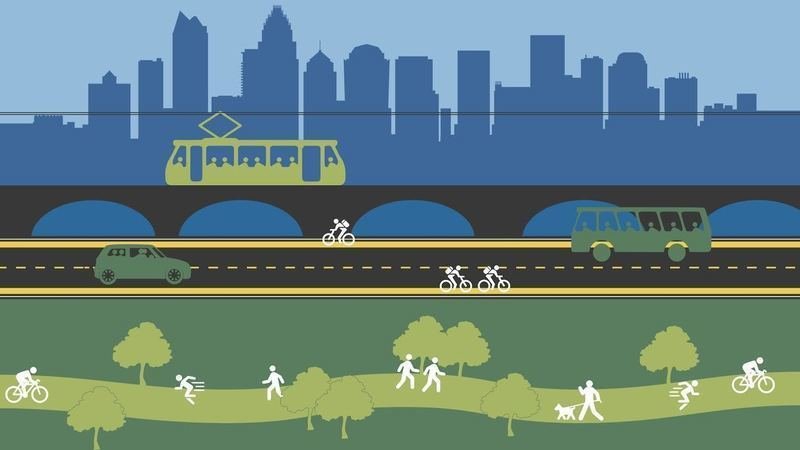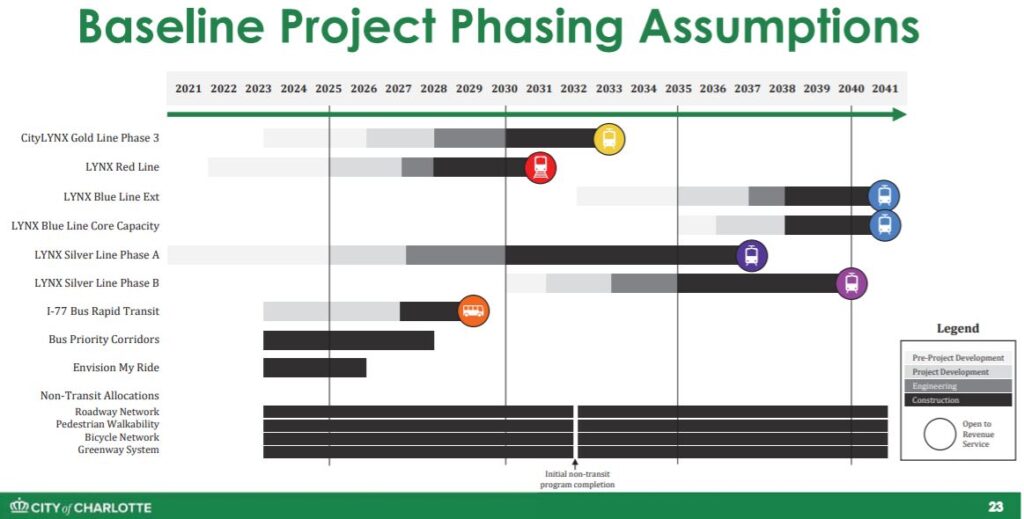Mobility transformation is needed sooner, not later
Our Challenge
Charlotte’s explosive growth continues. We support sustainable growth that ensures the Charlotte area is a great place to live and work for all. But our traditional growth pattern – low-density and heavily auto-centric — is not sustainable for the generations who will live and work here in the years ahead and has made living here difficult for many today.

Facing similar challenges, other fast-growing cities such as Austin, Seattle, and Denver are making ambitious investments to build diverse mobility networks. Unfortunately, Charlotte’s response has been lackluster. Our bus system is woefully inadequate and ranked among the poorest in the nation; rail transit expansion has been sporadic and limited; safe bicycle and pedestrian networks are needed.
Expeditious development of the Transformational Mobility Network (TMN) – with interconnected mobility options to serve everyone – is essential to a strong and sustainable future for the Charlotte area.

Based on the newest timeline for the TMN, several key transit projects wouldn’t be complete until 2040 or beyond. (image: City Council meeting notes)
What We Must Do
Making the TMN a reality requires a strong, unified commitment across our community. We must develop infrastructure – strategically and on an aggressive timetable that gets us ahead of our challenges. This requires a substantial public financial investment but the benefits are well worth it.
We applaud city staff for sharing a more detailed project timeline and cost estimate on June 28 for building the TMN. We are especially thrilled to see it recommended:
- Non-transit projects (bicycle, pedestrian, greenways, and roadways) would receive funding as soon as the sales tax is imposed in 2023 (assuming referendum passage in 2022);
- Implementing the bus priority corridors and Envision My Ride bus improvements also in 2023;
- Cost estimates and timelines for each transit project.
But other aspects of the proposal are concerning:
- Longer timelines for the rail projects – doubling the projected schedule for some – will significantly increase overall costs and limit our ability to achieve many goals of the 2040 Comprehensive Plan, as the future rail corridors fill up with incompatible development in the interim.
- The “one project at a time” approach to transit will delay vital improvements that our region needs now, not 20 years from now, and make it harder to meet the city’s adopted climate goals.
- No details have been shared on how the TMN sales tax’s 10 percent share for non-transit projects would be spent. The majority must go to pedestrian and bicycle infrastructure and greenways, not road capacity expansion – and still, that 10 percent may not be enough to deliver, in a timely way, the infrastructure we need to achieve adopted goals.
For the health of our residents, affordability, the climate, and long-term prosperity, Sustain Charlotte believes:
- We must prioritize the creation of a fast, frequent, and reliable bus network as soon as possible to support our economic growth and recovery by connecting people to jobs, higher education, health facilities, and other essential goods and services.
- Rail projects should be completed faster, perhaps in smaller phased segments (keeping in mind that a priority schedule already is needed for more significant segments requiring FTA funding.)
- An analysis is needed to determine how much money could be saved by building the rail projects faster. Inflation and interest will increase costs the longer we wait. The new projected cost for all transit projects of $11.6 billion is equivalent to $7.3 billion in today’s dollars ($4.3B in inflation costs over 18 years).
- The proposed sales tax should be augmented by other revenue sources, potentially including value capture from the increased property values of adjacent properties and additional vehicle licensing fees. (Denver’s multi-source approach was recommended by Charlotte’s Transit Funding Working Group in 2013. Seattle’s broader approach to funding also deserves review.)
- A detailed list of bicycle, pedestrian, and greenway projects must be developed soon, including the timing for each (following the model of the transit projects).
Building the full Transformational Mobility Network, on an expedited schedule, is essential to securing Charlotte’s position as a top-tier city.
This statement was developed by Sustain Charlotte in response to the presentation at the June 28, 2021, Charlotte City Council meeting.
Thanks for reading!
As a nonprofit, community support is essential for us to keep doing what we do — including providing free articles like this. If you found this article helpful, please consider supporting Sustain Charlotte.
Want to stay in the loop? Subscribe to our weekly newsletter and follow us on Instagram, Facebook, and Twitter.
